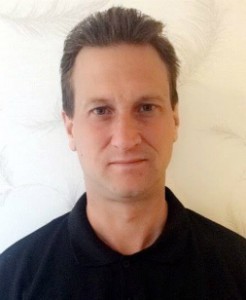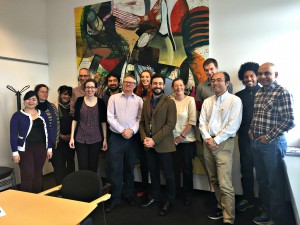 “A presupposition of the empirical and philosophical ‘problem of other minds’ is what’s come to be termed the ‘unobservability thesis’—the thesis that the other’s mind is fundamentally unobservable. In contradiction to this, at times throughout Husserl’s corpus he seems to suggest that in Einfühlung (empathy) we can observe the other’s mind directly and immediately. In my work I’ve tried to unravel precisely what Husserl might have meant behind this rather enigmatic claim, and if it is justified. One can also wonder, if it is the case that we can actually and literally see the others mind reliably, what flow on effects does this have for psychological science?
“A presupposition of the empirical and philosophical ‘problem of other minds’ is what’s come to be termed the ‘unobservability thesis’—the thesis that the other’s mind is fundamentally unobservable. In contradiction to this, at times throughout Husserl’s corpus he seems to suggest that in Einfühlung (empathy) we can observe the other’s mind directly and immediately. In my work I’ve tried to unravel precisely what Husserl might have meant behind this rather enigmatic claim, and if it is justified. One can also wonder, if it is the case that we can actually and literally see the others mind reliably, what flow on effects does this have for psychological science?
Read moreHeath Williams / Speculations on the future of Empirical and Phenomenological Psychologies

 Beginning of June I came to the CFS, in order to work with other phenomenologists. My stay here was also part of my sabbatical at the Free University Berlin, and my plan was to concentrate on my monograph on the “Sense of Appropriateness”, that I had begun to work on already four years ago, but which was always interrupted by my usual teaching, grading, and administrative workload. I thought a time, away from my office desk in Berlin, would give me the necessary focus to delve into this project.
Beginning of June I came to the CFS, in order to work with other phenomenologists. My stay here was also part of my sabbatical at the Free University Berlin, and my plan was to concentrate on my monograph on the “Sense of Appropriateness”, that I had begun to work on already four years ago, but which was always interrupted by my usual teaching, grading, and administrative workload. I thought a time, away from my office desk in Berlin, would give me the necessary focus to delve into this project.  For the past three months, it has been my great pleasure and honor to be a visiting researcher at the Center for Subjectivity Research. During my time in Copenhagen, I have advanced work on my dissertation, Pointing the Way to Speech: The Sources of Linguistic Intentionality.
For the past three months, it has been my great pleasure and honor to be a visiting researcher at the Center for Subjectivity Research. During my time in Copenhagen, I have advanced work on my dissertation, Pointing the Way to Speech: The Sources of Linguistic Intentionality.